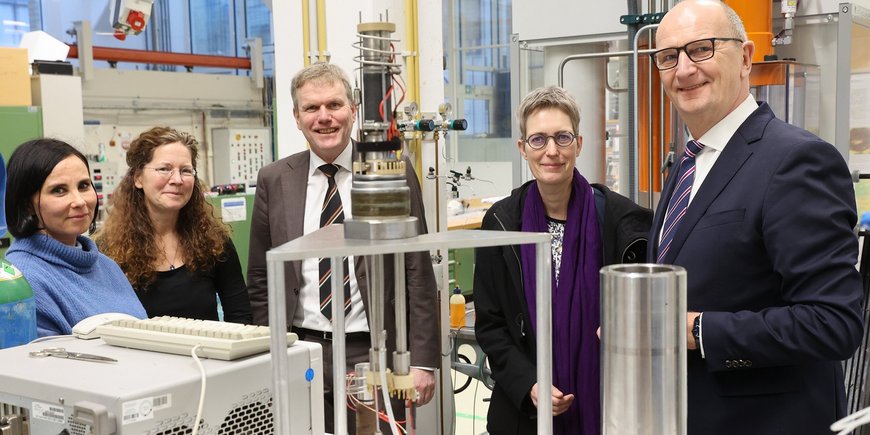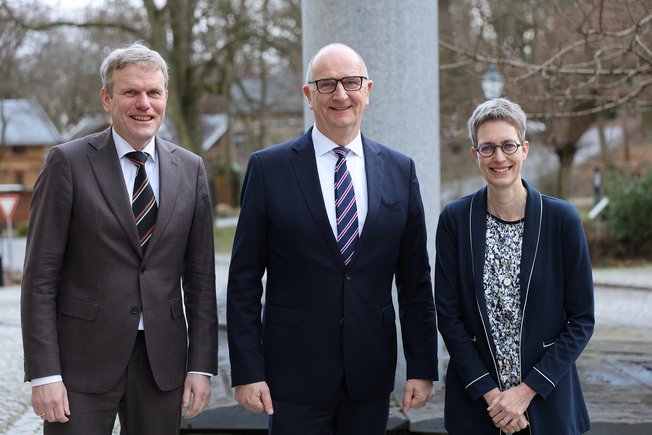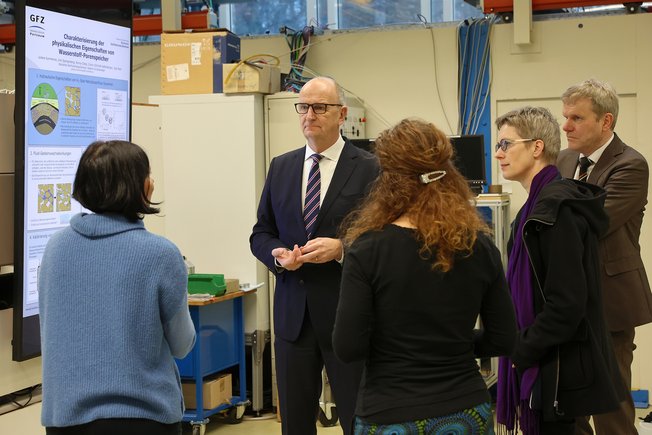Brandenburg's Minister President Dietmar Woidke visited the German Research Centre for Geosciences to find out about the GFZ's current research work. The focus was on the energy transition with the topics of geothermal energy and the underground storage of gases and energy sources such as hydrogen. Dietmar Woidke said: "The GFZ is helping to secure the energy supply of the future. Brandenburg also benefits from this." The Scientific Director of the GFZ, Susanne Buiter, added: "For us, as the national centre for geosciences, it is a matter of preserving the Earth as an intact habitat and using its resources carefully and sustainably. The energy transition is particularly important in this regard. An essential building block for this will be heat from underground, but also the storage of hydrogen in the depths. Brandenburg, as part of the North German Basin, offers the best conditions for both." The Minister President emphasised: "Climate neutrality has become an economic factor, also and especially for Brandenburg."
GFZ energy research: hydrogen storage
Future energy supply scenarios assume that hydrogen will play a major role as an energy carrier, especially for large industries such as pig iron and steel production or basic industries. Susanne Buiter emphasised: "In order to be able to store the scale of hydrogen required for industrial value chains, above-ground grid and storage infrastructures are not sufficient. Therefore, reliable geological storage of hydrogen is essential. Pore storage facilities such as aquifers and depleted natural gas deposits are particularly suitable for this. They are regionally widespread in Germany. And the GFZ has the expertise and the ambition to clarify open research questions with a demonstrator project in Brandenburg."
There is already a lot of experience with underground natural gas storage facilities, including research on CO2 storage in Ketzin, Brandenburg. But this cannot be transferred 1:1 to hydrogen, because hydrogen consists of very small molecules compared to other gases. This changes both the technological requirements for pipelines and seals and the requirements for underground storage facilities. The GFZ has well over a decade of experience in researching underground gas storage.
GFZ energy research: geothermal energy
In the field of geothermal energy, the GFZ is one of the leading and largest research institutions in Europe and has conducted groundbreaking research in this area, including in Groß Schönebeck in Brandenburg. It is currently involved in more than 30 application projects with national and international partners and is co-editor of the "Roadmap Deep Geothermal Energy for Germany".
GFZ climate and environment monitoring with satellites
In addition to the topic of energy, Minister President Woidke's visit focused on another GFZ research priority: monitoring the environment from space. The hyperspectral satellite EnMAP went into regular operation in November 2022 and, under the scientific direction of the GFZ, provides data on soils, raw material deposits and the condition of waters or forests. The GRACE-Follow-On satellite mission tracks changes in the global water cycle. Both missions provide valuable global and regional contributions to climate and environmental monitoring.












![[Translate to English:] Torsten Sachs in front of a climate station on a field](/fileadmin/_processed_/3/9/csm__TorstenSachs_bearbeitet_GS_4a1365ef84.jpeg)

![[Translate to English:] left image flood at the Ahrtal: image from above, several houses are flooded; left image:: Heidi Kreibich;](/fileadmin/_processed_/4/4/csm_Bild2_9af0130e9f.png)



![[Translate to English:] Start der Vega Rakete](/fileadmin/_processed_/6/4/csm_20231201-kachel_Vega-VV23-launch_ESA-CNES-Arianespace_706716b68c.jpeg)









![[Translate to English:] Poster exhibition at the Brandenburg Hydrogen Day at the GFZ, some participants in the foreground](/fileadmin/_processed_/6/5/csm_Erster_Brandenburgischer_Wasserstofftag_GFZ_402fcec95e.jpeg)
![[Translate to English:] Group picture of the participants](/fileadmin/_processed_/9/4/csm_20231108_CAWa-Workshop-Tashkent_Gruppenbild_99ea779d8a.jpeg)

![[Translate to English:] [Translate to English:] Hörsaal](/fileadmin/_processed_/e/6/csm_H%C3%B6rsal_e21ac645fb.jpeg)


![[Translate to English:] The Delegations in the Historic Library on the Telegrafenberg. In the back there are from left to right, the Dutch Ambassador for Germany, Ronald van Roeden, the Dutch Minister for Education, Culture and Science, Robbert Dijkgraaf and the scientific director of the GFZ, Susanne Buiter.](/fileadmin/_processed_/d/b/csm_Kachel-2_9eba4b4212.jpeg)

